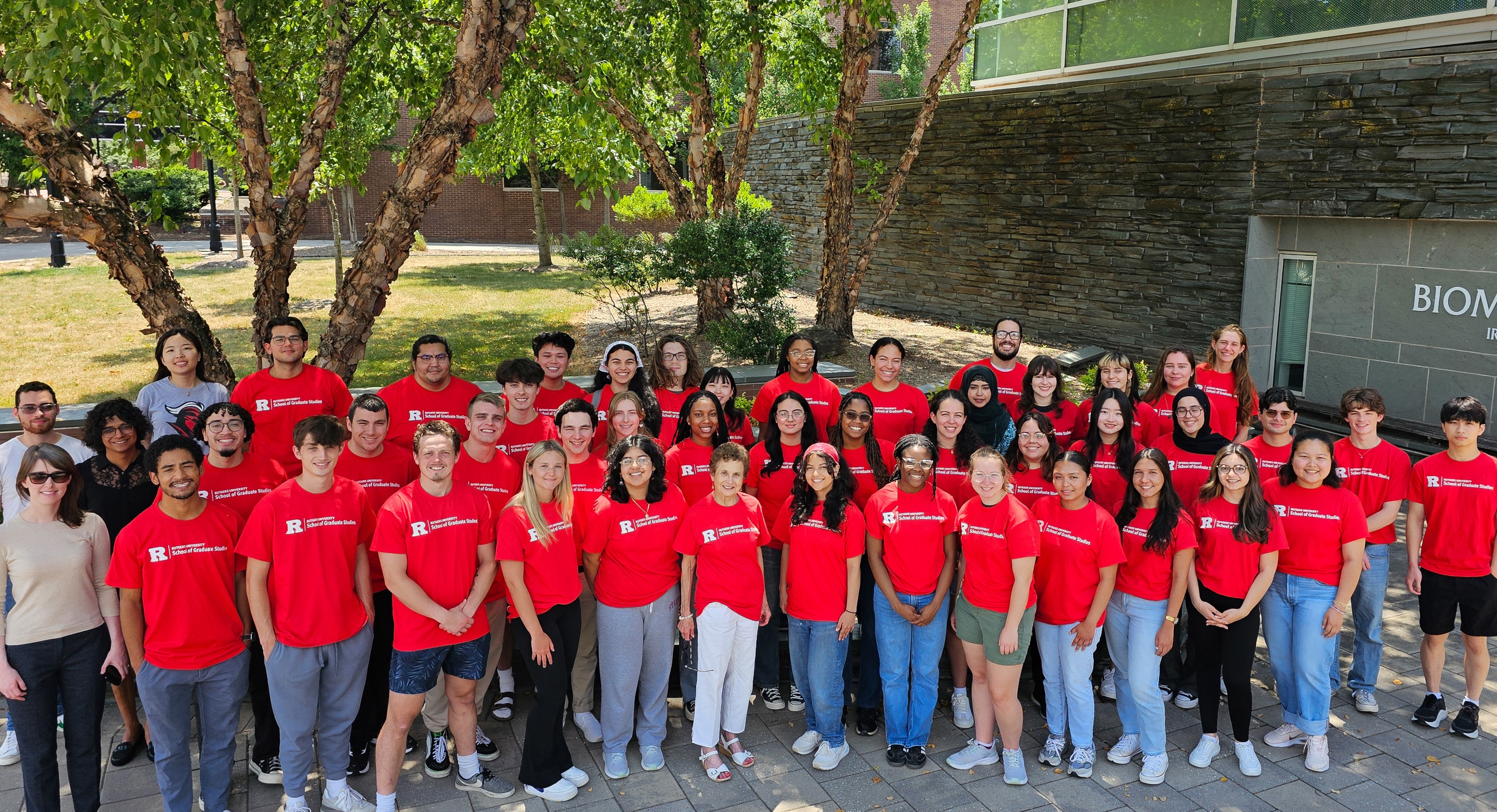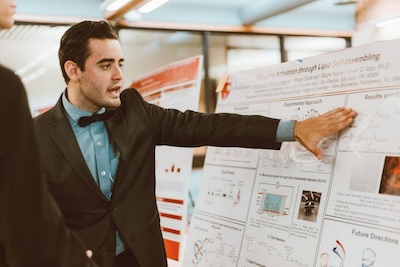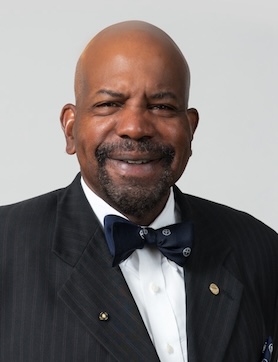RISE: Research Intensive Summer Experience 2024

RISE 2024 Symposium
Join us at our 2024 Symposium and Poster Session to celebrate the outstanding accomplishments of our Summer Scholars. Following an inspirational plenary speaker, meet the students at their posters and learn about the research they have done under the guidance of carefully-matched Rutgers faculty mentors. Our 43 participants represent 37 sending schools from 15 U.S. states and territories.
View Event Flyer
Date: Wednesday, July 31, 2024
Time: 9am - 2pm
Richard Weeks Hall of Engineering, Busch Campus
Agenda
| Time | Program Name | Presenter | |
| 9 - 9:30 AM | Coffee and registration | ||
| 9:30 - 9:40 AM | Welcome |
Dr. Evelyn Erenrich Director, RISE at Rutgers |
|
| 9:40 - 9:52 AM | Presentations by Gold medalists, 5 Minute Presentation (5MP) Competition |
Kelsie Bouyer Faculty Mentors: Dr. Andrea Gallavotti & Dr. Zongliang Chen Genetic Dissection of Cis-Regulatory Control of TEOSINTE BRANCHED1 Expression in Maize
Destiny McWilliams Faculty Mentor: Dr. Phoebe Stapleton Impact of Nanoparticle Inhalation on Term Rat Placental Structure |
|
| 9:52 – 9:55 | Brief remarks by 5MP Silver Medalists |
Brayden Messinger Faculty Mentor: Dr. Kate Waldie Pursuing a First-Row Transition Metal Catalyst Capable of Oxidizing Complex Alcohols
Karolina Wielowski Faculty Mentor: Dr. Richard Remsing Investigating Solid-state Electrolytes ~ An Opportunity for Enhanced Battery Performance |
|
| 9:55 AM | Introduction of Keynote Speaker |
Dr. Saundra Tomlinson-Clarke Provost & Executive Vice Chancellor Rutgers-New Brunswick |
|
| 10 - 10:50 AM |
Keynote Address Regenerative Engineering: My Pioneering Journey |
Dr. Cato T. Laurencin, MD, PhD University Professor University of Connecticut |
|
| 10:50 AM | Concluding remarks to Plenary | Dr. Evelyn Erenrich | |
| 11 - 11:55 AM | Scholar Research Posters - Odd numbers | ||
| 12-12:55 PM | Scholar Research Posters - Even numbers | ||
| 1:00 PM | Networking Buffet Luncheon in Busch Student Center | ||
Event Parking for the RISE/REU Symposium
All guests must register their vehicles. Visitors may park in Lots 51, 59, 60B & 67. Guests must use this link to register for the event. You will need enter an email address to receive a parking confirmation. Vehicles not registered may receive a citation. Special Event parking does not include metered parking or allow free parking to faculty, staff, or students. Rutgers affiliated Faculty, Staff and Students must have a Rutgers parking permit (Semester, Daily, or Event) and park accordingly. Faculty, Staff, and Students parking without a parking permit or outside their parking permit assignment will be subjected to ticketing and/or towing.
Poster Locations and Project Abstracts
Presenter titles, abstracts and biographies can be found here.
| 11:00-11:55 AM Session 1: Odd Number Poster Presentation 12:00-12:55 PM Session 2: Even Number Poster Presentation | ||||||||||
| Poster Number | Last Name | First Name + MI | Summer Scholar's Home Institution | Program Affiliation | Title | |||||
| 1 | Afzal | Sahrish | New Jersey Institute of Technology | Advanced Materials | Insights into colloidal rheology from molecular dynamics simulations | |||||
| 2 | Astacio-Berrios | Keryan A. | Uuniversity of Puerto Rico at Humacao | RISE | Identifying recombination in CBSD-causing viruses | |||||
| 3 | Blach | Thomas A. | The College of New Jersey | Advanced Materials | Improving acid digestion methodologies of sulfur containing aluminoborosilicates using ICP-OES | |||||
| 4 | Bouyer | Kelsie S. | Lafayette College | RISE/Waksman Institute of Microbiology |
Genetic dissection of cis-regulatory control of TEOSINTE BRANCHED1 expression in maize
|
|||||
| 5 | Brandstadter | Henry S. | Emory University | RISE/Cyberinfrastrurcture for AI for Science& Society (CASS) | Computational design of alpha-synuclein degradation capable proteins | |||||
| 6 | Bush | Joe K. | Reed College | Advanced Materials | Investigation of the Electronic Properties of Cr-based Oligomers for the Development of Functional Materials | |||||
| 7 | Calbert | Latherial R. | College of Charleston | Cellular Bioengineering | Deep learning meets sleep medicine: clustering cpap adherence data for enhanced osa management | |||||
| 8 | Carver | Monique H. | Navajo Technical University | RISE | Predicting metal contamination in the Newark Basin using a composite stratigraphic record | |||||
| 9 | de Guzman | Joshua | Rowan University | Cellular Bioengineering | Assessing the impact of blood plasma components on clot mechanical properties | |||||
| 10 | Fulford | Kristen S. | Commonwealth University of PA - Mansfield | RISE/Waksman Institute of Microbiology | Screening for genes involved in meiosis and fertility in the Drosophila ovary | |||||
| 11 | Gallo | Michael C | The College of New Jersey | RISE | Synthesis of (pybox)osmium complexes for C-H activation and related reactions | |||||
| 12 | García Quiñones | Ian M. | University of Puerto Rico Río Piedras | RISE | Development of a molecular glue to recruit E3 ligases for the degradation of Alpha-synuclein | |||||
| 13 | Garcia | Albert | Caldwell University | RISE | Glutamatergic signaling in acral and mucosal melanoma | |||||
| 14 | Gilbert | Ashley P. | Michigan State University | RISE/SURF | Liver toxicity of immune checkpoint inhibitor drugs in mice with a humanized immune system | |||||
| 15 | Guerra Hernandez | Yaneli | Duke University | RISE/Waksman Institute of Microbiology | Role of QueE enzyme in metal stress response and growth phenotypes in E. coli | |||||
| 16 | Gushikem | Rachel | Montclair State University | RISE | Enhancing tamoxifen's drug-like properties through the incorporation of isosorbide units | |||||
| 17 | Herrera Villavicencio | Kelly L. | Rutgers University Newark | RISE | Determining the Effect of Ag270 on the Metastasis of Triple Negative Breast Cancer Cells | |||||
| 18 | Hoyt | David S. | Drew University | Cellular Bioengineering | Impact of Gsx1 Gene Therapy on Microglia after Acute Spinal Cord Injury | |||||
| 19 | Jiang | Judy | CUNY Hunter College | RISE | Examining the neuroanatomical effects of Insomniac C-terminal mutants | |||||
| 20 | Kwak | Hwa-Jin P. | University of Hawaii at Manoa | Cellular Bioengineering | Short-wave infrared emitting rare earth doped nanoparticles for metastasis surveillance | |||||
| 21 | Laghzizal | Hiba | California State Polytechnic University, Pomona | Advanced Materials | Techno-economic analysis of power generation cycles for waste plastic via integrated gasification combined cycle compared to coal and natural gas | |||||
| 22 | Li | Emily A. | Rutgers University - New Brunswick | Advanced Materials | Controlling porosity of electrosprayed polyimide films through co-solvent blending | |||||
| 23 | Lopez-Rodriguez | Andrea | Interamerican University of Puerto Rico at Aguadilla | RISE/SURF | The role of the integrated stress response in alveolar epithelial injury following acute ozone exposure in mice. | |||||
| 24 | Luengo Martinez | Andres D. | The University of Texas at Austin | Cellular Bioengineering | Modeling acupuncture needling using in vitro collagen gels with varying collagen concentration | |||||
| 25 | McGovern | Cameron C. | The College of New Jersey | RISE | Utilizing synthetic motors to alter DNA conformation for advancements in therapeutic delivery | |||||
| 26 | McWilliams | Destiny N. | Villanova University | RISE/SURF | Impact of nanoparticle inhalation on term rat placental structure | |||||
| 27 | Messinger | Brayden M. | The College of New Jersey | RISE | Exploring metal-ligand catalyst structures capable of oxidize complex alcohols | |||||
| 28 | Miller | Dylan M. | East Carolina University | Cellular Bioengineering | Machine learning approach to quantifying influences on trauma mortality | |||||
| 29 | Morsy | Habiba H. | Kean University | RISE/Protein Data Bank | Streamlining programmatic access to structural biology data with Python | |||||
| 30 | Ortiz | Roselyn S. | Syracuse University | RISE | Harnessing cognitive science discoveries to combat parents' and children's biases against math learning | |||||
| 31 | Padilla López | Amanda | University of Puerto Rico Mayagüez | Cellular Bioengineering | The effect of nebulization on novel polyelectrolyte surfactant nanoparticles to treat Pseudomonas aeruginosa infections | |||||
| 32 | Palade | Diana J. | West Chester University of Pennsylvania | Cellular Bioengineering | Modeling the effects of skin pigmentation on light transmittance during photodynamic therapy: Implications for a novel drug targeting and delivery system | |||||
| 33 | Quysbertf | Helberth M. | Saint Peter’s University | Cellular Bioengineering | Microenvironment Stiffness Role on Triple-negative Breast Cancer Metastasis: Local Infiltration and Distant Proliferation | |||||
| 34 | Reyes | Samantha | Saint Elizabeth University | Advanced Materials | How salt concentration affects phase separation of cationic intrinsically disordered protein | |||||
| 35 | Riley | Kaylin | University of Georgia | Cellular Bioengineering | Investigating the efficacy and stability of nanotechnology for alzheimer's treatments | |||||
| 36 | Romero | David E. | Ramapo College of New Jersey | RISE | Stabilizing Lipase Under Extreme Conditions: A Machine Learning Approach to Polymer Design | |||||
| 37 | Rund | Sophie M. | Rose-Hulman Institute of Technology | Cellular Bioengineering | Using machine-learning to observe and record spinal cord injury progress in mice | |||||
| 38 | Schreiber | Maya R | University of Maryland, Baltimore County | Cellular Bioengineering | Measuring oxygen consumption rate to understand optimal chronic wound healing environments | |||||
| 39 | Trivella | Edward A | New Jersey Instiute of Technology | Advanced Materials | Carbon Modified Phase Change Materials | |||||
| 40 | Truong | Ivana | University of Minnesota Twin Cities | RISE/Protein Data Bank | Developing computational toolkits for facilitating structural bioinformatics research | |||||
| 41 | Wielowski | Karolina | The College of New Jersey | Advanced Materials | Investigating solid-state electrolyte through Molecular Dynamics Simulations – An opportunity for enhanced battery performance | |||||
| 42 | Wong | Kevin | Rutgers University-New Brunswick | RISE/Cyberinfrastrurcture for AI for Science& Society (CASS) | Classification and Extraction of Synoptic Weather Features using Neural Networks | |||||
More About RISE

RISE (Research Intensive Summer Experience) at Rutgers seeks to pave the pathway to graduate study and research careers. We particularly encourage participation by underrepresented minority, disadvantaged, and first-generation college students, individuals with disabilities and who have faced life challenges, as well as students from Predominantly Undergraduate Institutions.
2024 marks our 24th anniversary! RISE and its partners are hosting 43 Scholars, selected from over 1100 applicants nationwide. They have spent 10 weeks actively engaged in research and scholarship under the guidance of matched Rutgers faculty mentors and graduate student or postdoctoral near-peers. A rigorous suite of professional development activities complements the research, including scholarly writing and speaking, preparation for graduate school, responsible conduct of research and ethics, field trips, and GRE preparation. Lunch and Learn seminars spotlight a broad scope of research at Rutgerss.
To learn more, visit https://rise.rutgers.edu
RISE Partner Programs at Rutgers:
- REU in Cellular Bioengineering
- REU in Advanced Materials
- Summer Undergraduate Research Fellowship (SURF)
School/Unit Collaborators:
- School of Arts and Sciences
- School of Engineering
- School of Environmental and Biological Sciences
- Ernest Mario School of Pharmacy
- Biomedical & Health Sciences – Robert Wood Johnson Medical School
- RCSB Protein Data Bank
- Waksman Institute of Microbiology

Meet our distinguished Symposium Keynote Speaker, Dr. Cato T. Laurencin

Cato T. Laurencin, M.D., Ph.D. is the University Professor at the University of Connecticut (one of only two at the school). He is Professor of Chemical and Biomolecular Engineering, Professor of Materials Science and Engineering, and Professor of Biomedical Engineering at UConn. He is also the Albert and Wilda Van Dusen Distinguished Endowed Professor of Orthopaedic Surgery. He is the Chief Executive Officer of The Cato T. Laurencin Institute for Regenerative Engineering, an Institute named in his honor.
Acknowledgements
We gratefully acknowledge financial support from:
Institutional sources:
Chancellor Challenge: Cyberinfrastructure for AI for Science and Society (CASS)
School of Graduate Studies
Waksman Institute of Microbiology
RCSB Protein Data Bank
External:
Aman Armaan Ahmed Family
Gerald B. Shreiber Foundation
NASA New Jersey Space Grant Consortium
National Institutes of Health
NSF Research Experiences for Undergraduates (REU) Program
Faculty cost-share from NSF CAREER Awards, REU supplements, and other research grants.
Society of Toxicology
ASPET
Our research program would not be possible without the support of the dedicated faculty members who have donated their time, energy, and laboratory supplies and space. We are also grateful for the financial support that some faculty mentors provided through research grants or supplements. In addition, we thank the graduate students and postdoctoral near-peer mentors for their invaluable guidance and commitment.
Our program comes together only through the dedication and countless hours of hard work on the part of the Program Directors and staff, acknowledged with deep gratitude.
We thank University Libraries for their help designing and hosting this site and for maintaining a digital archive of posters and video presentations.
Past years' exhibits
To visit the 2022, 2021 and 2020 Symposia pages, please select from the links below: